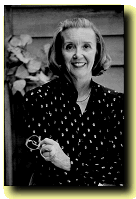 |
|
|
|
|
|
|
|
|
|
|
|
|
|
|
|
|
Writing Tips
Betsy Byars
Children's Author, Newbery Award Winner
![]()
When I was your age, I was like you - I read all the time. That was one of the main reason I succeeded as a writer - I had developed an ease with words. That's my first tip - read!
 Since you are interested in writing, try to write about what you know - your cat, your dog, your experiences, or the experiences of your friend or your friend's cat, etc. Don't try to write about places you've never seen. That was the first bit of advice I got - I think in third grade. "Write about what you know," Mrs. Stroupe said - and I thought that was the dumbest thing I had ever heard in my life. Sure it might be fine to write about what you know if you were Charles Lindbergh or Clyde Beatty (my two heroes back
then) But if you were a girl growing up in rural North Carolina, you better make up some stuff.
Since you are interested in writing, try to write about what you know - your cat, your dog, your experiences, or the experiences of your friend or your friend's cat, etc. Don't try to write about places you've never seen. That was the first bit of advice I got - I think in third grade. "Write about what you know," Mrs. Stroupe said - and I thought that was the dumbest thing I had ever heard in my life. Sure it might be fine to write about what you know if you were Charles Lindbergh or Clyde Beatty (my two heroes back
then) But if you were a girl growing up in rural North Carolina, you better make up some stuff.
No one told me back then why you write about what you know. I finally figured it our myself. When you write about what you know, you are writing with authority. The two words go together - author - authority, and what that means is that when you write with authority, you give your reader the feeling, "This author knows what he, or she, is talking about. That's very important.
Read what you have written aloud. I read my writing aloud as I go. If it doesn't sound well, it won't read well. When I first began writing, my kids would say, "Who are you talking to in there?" because I spoke the conversations as I wrote them.
Cast your characters. It's like you're doing a movie. Pick an actor or actress that fits the part. When you write the dialog, imagine that actor or actress saying the lines.
Play up your strengths. My strength is writing dialog, and my weakness (one of them) is writing description. Therefore I have lots and lots of talking in my books. I hardly ever physically describe my characters. I never write something like, "He was a fat boy with blah, blah, blah." I show that he was fat by having him talk about food a lot or raiding the frig.
When I first started writing, I wrote on the typewriter (now it's the computer). I didn't write in longhand because it wasn't possible for me to see what I had done right (or wrong) if it was in my own handwriting. It had to be in print for me to judge it. Then I would take the typescript, edit it by hand, retype it (putting in the changes). Then I'd read it again, edit it again, etc. I would keep working on it until it looked as if I hadn't worked on it at all. If it looked as if I'd worked on it, I'd go back and work on it some more.
My last tip on writing is - To keep your work in perspective and to prepare for a period of apprenticeship. Writing is like playing the piano or playing baseball - you have to practice to get good.
I can remember a moment with my kids that became a turning point in my career. My kids came home from school one day and I had gotten a manuscript back that morning. I was disappointed and one of my kids looked at me and said, "Oh, did you get rejected again?" And I thought, wait a minute, if my kids can tell when they walk in the door that I've gotten a rejection slip, then I'm going to have to either get this in perspective or stop writing. Obviously I managed to get it in perspective. I did have disappointments after that and I still have rejections, but the fact that I learned to take it all less seriously helped both me and my writing.
Good luck!